Becoming Superhuman: Powerful Breathwork Techniques to Supercharge Your Energy, Health, Strength and Vitality
superhuman abilities often surface after powerful, energy-generating transformational breathwork techniques are practiced regularly to the point of mastery. photo: lerina winter
And while that’s all well and good, what I am interested in is how we can use transformational breathwork to supercharge our strength, our health, and our life right now to better handle the daily stressors and responsibilities that can drain our passion and inspiration if left unchecked. Knowing that we have a vast potential for vibrant health and superhuman ability within us, what is the most effective way to expand our resilience and vitality?
There is scientific documentation of people who can subsist on sunlight alone. There are even people whose breathwork techniques enable them to hold their breath for over 20 minutes underwater, as unbelievable as it may seem. Tibetan monks can sit naked in the snow and dry ice-cold wet robes on their bodies by increasing their skin temperature through specialized breathing and meditation techniques. These are not tricks. They’re the result of focused training of the mind and physiology.
Breathwork and focus of the mind are two primary keys that can unlock your virtually limitless potential. In my decades of experience as a teacher and student on the path of yoga, Qi Gong, and Tantra, I have come to know that conscious breathing is the thread of connection between them all. Each system has a legacy of powerful practices designed to increase the depth and richness of our breath, the energy it cultivates, and the awareness it brings.
Life, whether we are aware of it or not, is sustained by the exchange of energy on a microcosmic, cellular level. Everything we experience is the direct result of a web of life force energy constantly exchanging and evolving from the tiniest plants, creatures, and particles to the planets, stars, galaxies, and everything in between. Energy sustains the universe and it sustains us, and how much of it we have accumulated in any given moment determines the quality of our lives to quite a large degree. Those with seemingly superhuman abilities have simply mastered the art of collecting this energy, most often through breathwork techniques like the ones I am going to outline below.
The Mechanics of Becoming Superhuman
Your breathwork is a molecular exchange of energy in and out of your bloodstream. These molecules are made up of smaller units of energy called atoms; and atoms are constructed of even smaller bits of energy referred to as subatomic particles, which are actually not particles at all. We can dissect life (as we know it) down to the isolation of energy bouncing back and forth between what appears to be a particle and what appears to be a wave depending on how it is observed.
Does an electron or proton or some other subatomic particle require nourishment? Not that we know of. Atoms, which are constructed of subatomic elements, don’t appear to eat either. What about molecules, which are made of atoms? The same pattern appears: they don’t require food. This logical train of reasoning now brings us to cell structure and the question of what sustains healthy cells? What do cells eat to energize and perpetuate all the functions of our bodies and minds? The answer is, according to Daoist and Hindu philosophies (along with many other wise ancient cultures that have created incredibly detailed, accurate, and sophisticated systems of biomechanics that pre-date modern medicine by thousands of years) what is referred to as life force energy that we extract through the air we breathe and food we eat. This energy, which we can harness through our breathwork techniques, is known by many names such as Qi, Prana, Mana, and Ruach, depending on the culture involved.
Metabolism is the method by which the body transforms food into energy by altering its molecular chemistry. A chemical is an element that has an influence or produces an effect. The process of metabolism is like a fire. Without air, a fire will go out; breathing fans the flames of the internal cellular fire with fresh oxygen and other gasses that create heat and transformation in the body. Do you see where we are headed? Therefore, the fastest and most effective way to feed and supercharge your body is through your transformational breathwork.
One of the essential ways a chemical element produces an effect is by oxidation—that is by combining or reacting with oxygen. The “burning” or oxidation of food is called catabolism. Catabolism breaks down food into simpler chemical compounds like glucose, amino acids, fats, etc., which are converted into carbon dioxide, water, and nitrogen waste products.
Unless catabolism is complete, no anabolism, which is the constructive part of metabolism, can take place. Anabolism utilizes the energy/heat released from the energy-rich phosphate compounds that have been oxidized. Catabolism must occur before any energy can be released to stimulate the growth of human cell structure. Breathwork is the key component to allow oxidation by catabolism to take place in the cells of your body. Deep, focused, rhythmic breathing then supercharges this process, which—when undertaken consciously and consistently—allows us to supercharge our health; and, in combination with special meditative techniques, allows us to begin demonstrating superhuman abilities like those I have described earlier.
All of the food and the energy contained therein that goes into the body will eventually go out of the body through defecation, urination, perspiration, or exhalation. If you don’t properly eliminate, you will accumulate stagnant waste products and become congested and overly acidic. Exhaling is the most efficient way to detoxify and alkalize your body. There are specific breathwork techniques that focus on the exhale to cleanse the lungs and blood, which is essential for healing, regeneration, and overall vitality and strength. The energy breathing practice, which I share below, is one such exercise and is foundational for supercharging and preparing the body for radiant health and more advanced superhuman abilities.
According to both yogic science and Traditional Chinese Medicine, when certain organ systems, meridians, or body parts are deprived of life force, or severely imbalanced, degeneration or malignancy may result. With your breathwork, the pumping of your lungs and heart moves an invisible flow of life force energy through the tissues of the body in a specific rhythm and pattern. This pattern of energy flow is what the Chinese describe as meridians and the yogis call nadis, both terms referring to a network of “energetic channels,” analogous to the nervous system on an etheric level. The level of free flow of energy through these channels creates an energetic blueprint that forms the basis of how your body functions as well as how you feel.
The ancients believed that this life force, Qi, or Prana (depending on the term you prefer) supplied the bioelectricity necessary to keep the vitality of the body and mind balanced and sound; and we are most connected with our emotional, energetic and physical bodies when we are consciously connected with our breathing. In many cultures, the word for “breath” can also be translated as “soul” or “spirit.” This is why the ancient healing modalities of yoga, Qi Gong and Tantra have placed so much importance on being aware of one’s breathing—because this is where you have the power to radically improve your health and vitality. When you breathe in a relaxed and deep way, the meridian and nadi pathways of your body open to increase circulation and energy absorption. When feeling stressed and tense, your breathwork becomes shallow and your vitality begins to wane as a result.
While it might seem very challenging to be constantly monitoring your breath, you can take designated breaks throughout the day to breathe more fully and deeply to supercharge your energy. These breaks can be as simple as taking three conscious breaths; however, I recommend 10 to 20 deep, full-lung capacity breaths to cleanse and recharge yourself. When we become stressed and emotionally repressed our breathwork becomes shallow and constricted, our posture becomes poor, and the lungs and oxygen-carrying red blood cells have a much harder job to do.
Just as physical posture adapts to an unnatural structure due to unconscious patterns, breathwork likewise reverts to becoming more shallow and unconsciously controlled by a more primitive part of the brain. The breath rhythms adjust to subconsciously stored emotional traumas, resulting in bio-physiological disturbances. Our emotions are so closely aligned with the breath that any readjustments by the primitive part of the brain can produce unexplainable and disturbing states of fear, anxiety, aggression, depression, or other alarming emotions associated with such breathing rhythms.
This is why proper breathwork techniques can be amazingly effective when we encounter stressful situations and emotional storms. If you commit to taking regular breaks in your day to consciously breathe, you’ll be astounded at how regenerative and centering such a simple practice can be—not only for your emotional health, but also for your physical health. Taken consistently throughout the day, you begin to rewire and re-energize the functioning of the body and set the stage for vibrant health and superhuman energy. While it may seem like a simple practice, like a well filling with water, our bodies accumulate energy over time. Practicing daily on an ongoing basis will lead to truly extraordinary levels of strength, vitality, and radiance.
So, give it a try now. Take ten long, deep, connected breaths. Here’s how you do it:
When you inhale, allow your abdomen to extend outward in a relaxed fashion that allows your diaphragm to drop and your lungs to fill up from the bottom. If you don’t naturally do this (and all babies naturally use these breathwork techniques), stale toxic air will accumulate in the lungs and you’ll experience diminished lung capacity and a lack of vitality.
When you exhale, your abdomen comes in and your diaphragm pushes upward to squeeze the air out, resulting in a complete breath. Between your exhalation and your next inhalation, you’ll notice a slight pause, like when the surf on a beach comes in and then returns to the sea. This pause connects the old breath to the new breath. Allow your attention to rest on the pause at the end of the exhalation for a moment on each breathwork cycle.
Can you feel how simple and effective focused breathing is? Every time you take a break from work, you can be supercharging yourself with transformational breathwork. The benefits will speak for themselves when you take the time to practice. Once you have mastered your ability to do long, deep, connected breaths, you can more fully activate your lungs and revitalize your whole body by practicing this next breathing exercise. It is one of my personal favorites and a very powerful way to simultaneously cleanse and energize the body.
Energizing Breathwork Practice
This practice is intended to generate more clarity, energy, strength, and overall vitality. You will feel this as you focus your attention on the transformational breathwork and movement. This practice will also help to cleanse your physical and energetic body. Shaolin warrior monks—renown for demonstrating superhuman abilities and strength—would use practices like this to warm up their whole bodies and prepare their minds for intensive training or battles.
As you first begin to practice, do three to five rounds or cycles of the sequence. As you become more proficient in this breathwork technique, increase to nine rounds and then 18. Each round is a four-breath cycle. On the inhale, you are drawing in the breath to maximize your lung capacity. The idea is to stretch the alveoli sacks of your lungs to their full capacity to receive the oxygen and Prana/life force fully into your bloodstream. The exhales are done with the intention of moving the energy in your body in each direction in a powerful and invigorating way. This activates your circulation, cleansing your blood and energetic field, while also distributing the vital force (Pranic or Qi) energy throughout your body.
You can explore this practice either sitting or standing. I will describe it as a standing practice because this is how I prefer to practice it. The images show me in a seated position.
Step 1-3
To start this breathwork technique, begin standing with your feet wider apart than your shoulders and your knees slightly bent. Have your stance feel strong and grounded into the earth. Next, lengthen your spine by dropping your chin slightly and lifting the top of your head. With the first inhale, draw your elbows back and your hands to your ribs, with the palms up.
Step 4
Next, exhale and push your hands forward, with your palms pressing out as if you are pushing someone away from you.
Step 5
On the second inhale draw the elbows back and palms face up to the ribs in the same way as the first inhale.
Step 6
On the second exhale, push your hands and energy straight out to the sides at shoulder height.
Step 7-8
On the third inhale, repeat the first move of drawing your hands and elbows toward your ribs with the palms facing up like the first image. On the third exhale, push your hands and energy down with the palms face down.
Step 9-10
On the fourth and final breath, repeat the first move of drawing your hands and elbows toward your ribs, with the palms facing up like the first image. For the last exhale of the sequence, push the hands and energy straight up.
Step 11
After you have completed three to five rounds of the transformational breathwork, rest your hands over your lower belly center (or lower dantian), just below your navel; close your eyes and feel the circulation of life force energy shimmering throughout your body. Allow a minute or so to assimilate the energy in stillness. This practice works well as a warm up for most sport activities to sharpen your focus and ready your body for movement, or as a way to enliven your self during a break from the office. The magic key is focus and consistency. It may take a while to cultivate the full benefits of this practice, so practice it often and experience the amazing benefits for yourself.
Video Demonstration
Shems Heartwell is a certified relationship coach and breathwork specialist residing in Hawaii. He has been a student of qigong and yoga for the past 18 years, during which he has studied with numerous teachers, mentors, and spiritual guides. Shems is committed to being a catalyst for transformation and dedicates his work to helping individuals awaken to their powerful innate abilities to be the same. Visit his website: shemsheartwell.com.

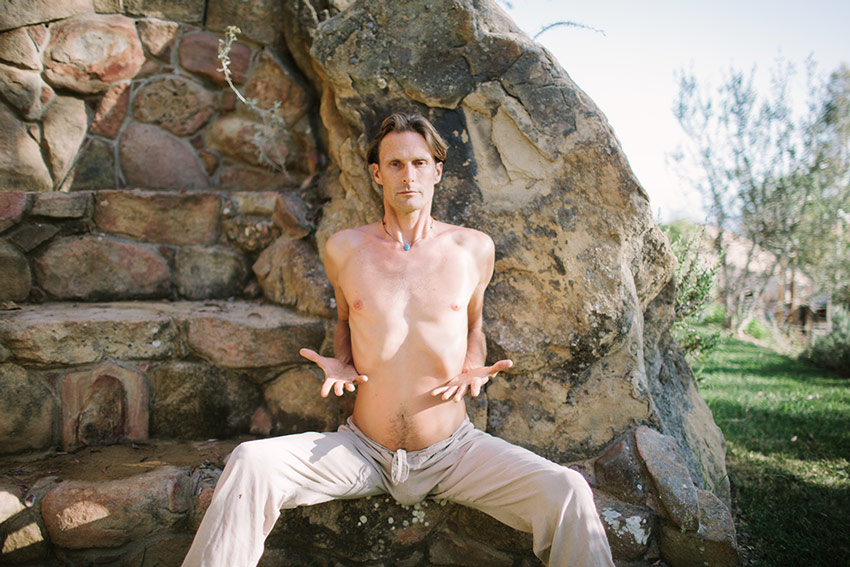
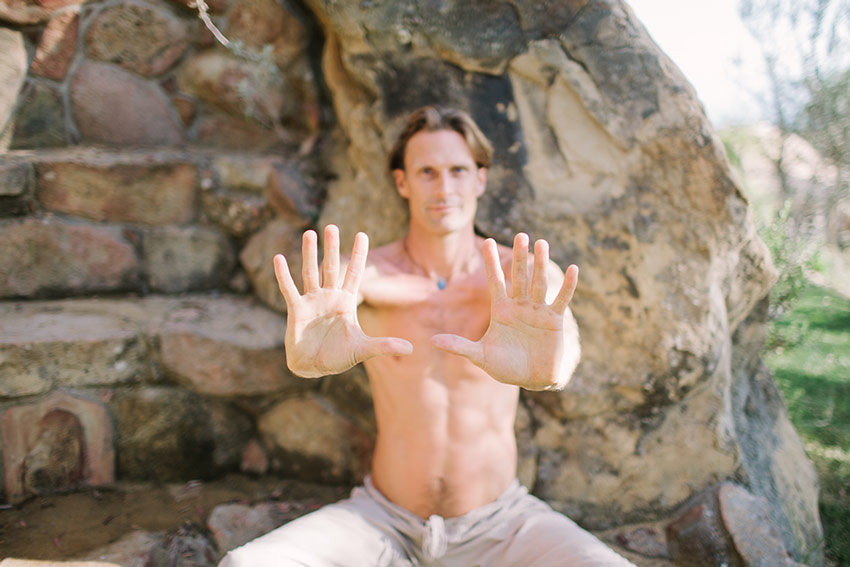
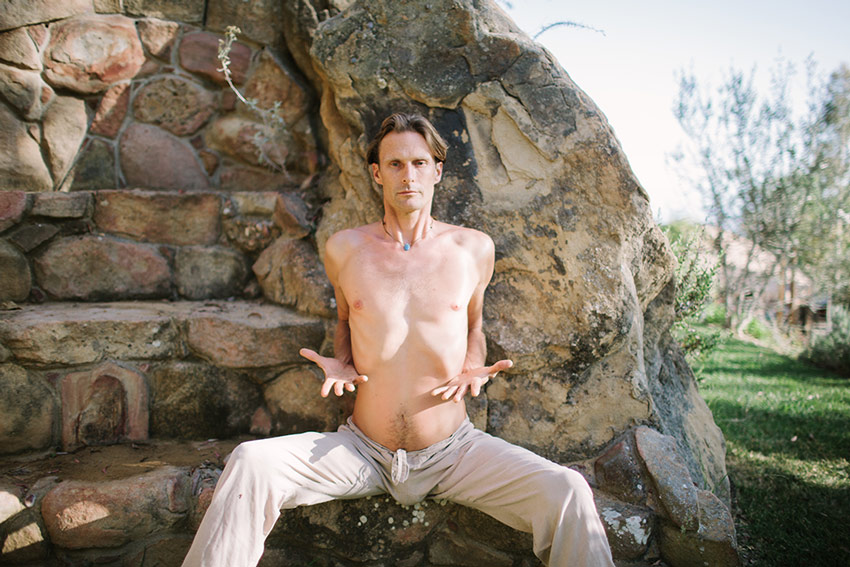
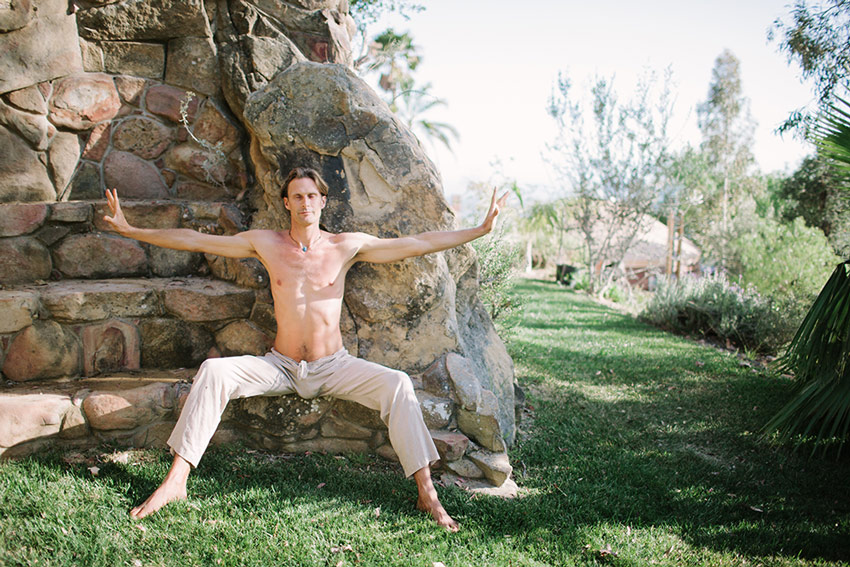
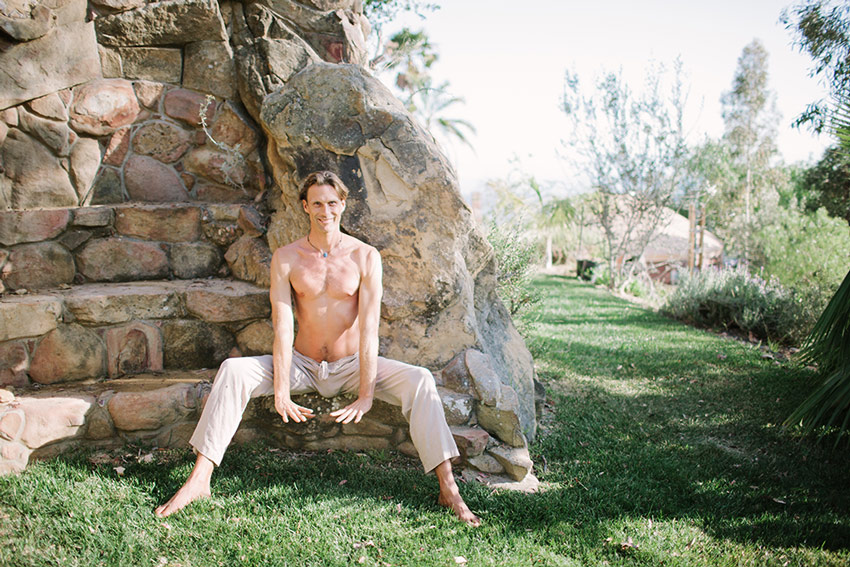





























1 Response
[…] I’ve developed an ability to read not only the story in their voice but the meaning in their breathing. Words are powerful clues, but the spaces between the words are often even more potent. It was […]